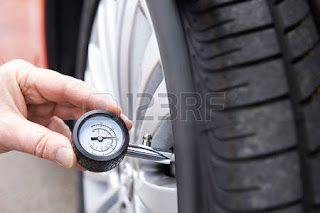Proper maintenance of your car can be important for its long life
and safe operation. Your tires are one of the most important parts of your car,
which means regular care and maintenance are crucial to the safe and reliable
performance of your vehicle. Below are a few tips to follow when you are
checking your tire pressure.
When
should I check my tire pressure? Tire pressure should be checked once
a month, especially when the tires are cold. You may also want to consider
checking your tire pressure more frequently in the following instances:
- · If you run over a sharp object, like a nail, that can puncture the rubber.
- · If you strike a curb or other object.
- · If the weather suddenly changes from warm to cold.
How do I
check my tire pressure?
1.
Remove the cap from the air valve of the tire
by unscrewing it and press the tire gauge against the open valve stem – you
will hear a hiss of air (this is normal)
2.
Read the air pressure gauge. The number will
appear on the dial or digital screen on the tire gauge. Compare this number
with the recommended
tire pressure, found on the driver’s side door jamb
3.
Add air or let some out based on the
recommendation
4.
Replace the tire’s air valve cap by screwing
it on clockwise






